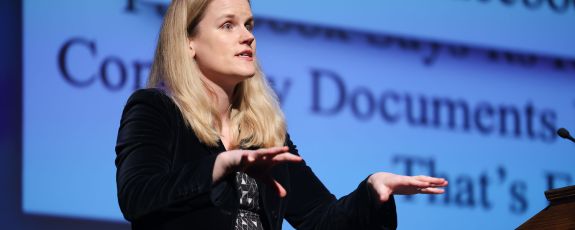
Facebook Whistleblower to Students: You Be the Change
Provost’s Forum speaker shares story of bringing accountability to Big Tech
Haugen is a data scientist, best known as having blown the whistle on Facebook by turning over 22,000 pages of secretly copied company documents to the federal government and the media on the tech giant’s questionable business practices. She has a degree in computer engineering from Olin College and a Harvard master's degree in business.
People Listened
“A lot of people were ringing the alarm bell for ten years, but I was able to validate it,” said Haugen, who worked at Google, Yelp, and Pinterest before moving on to Facebook, where she was hired to be part of a civic integrity unit.
She found that Facebook and its other product, Instagram, used powerful algorithms to inflict political, social, or emotional harm on users. Although she said, “There was a long series of things that made me realize the severity of the problem,” the tipping point came when the civic integrity unit was dissolved after the 2020 election.
Earlier allegations were made by others that Facebook was used by militias to sow violence in Ethiopia and Myanmar. The documents she quietly gathered, coupled with her determination to bring change, helped buttress her claims, and get people to stop and listen.
“I had a window into what Facebook looked like outside of the U.S. that others did not,” Haugen said.
Since going public in April 2021, Haugen has testified in front of Congress, parliaments in the U.K. and European Union, the French Senate, and National Assembly.
While her testimony in the U.S. has led to little change here, last year the European Union passed the Digital Services and Digital Markets acts which have two main goals: to create a safer digital space in which the basic rights of all digital services users are protected; and to establish a level playing field to foster innovation, growth, and competitiveness, both in the European Single Market and worldwide.
The act is designed to have an impact on every social network, search engine, and online marketplace that does business in the EU and hold them accountable for illegal and harmful content. It also requires platforms to share how their algorithms work and to crack down on misinformation and those who spread it.

Why Facebook?
Haugen blamed some of Facebook’s problems on a revolving door of staff, with many of its employees at a junior level and who don’t know what is “normal” and what isn’t. She said change must come from within the company, but also from the next generation of leaders.
“How does the next generation of leaders who don’t have the full experience to understand how things work from beginning to end, start to see the problems and come up with solutions?” she asked.
She urged her audience, as they go out into the world, to ask questions. “When you interview you get to influence that company. Part of how companies realize things is because potential or current employees ask questions.” She added: “The first step is employees need to learn they have power.”
What’s Next?
Last September, Haugen founded Beyond the Screen, a nonprofit “to advance a new, open-source effort aimed at holding social networking platforms accountable for harmful practices and reducing social media's negative impacts,” according to a news release. She is doing it in collaboration with Project Liberty, an initiative to transform how the Internet works, who owns and controls personal data, and who benefits from the digital economy.
Duke Law and Philosophy Professor Nita Farahany, who interviewed Haugen for the forum, lauded her bravery.
“Her courage and dedication are an inspiration,” Farahany said. “It’s a call to action to all of us to be part of the solution.”